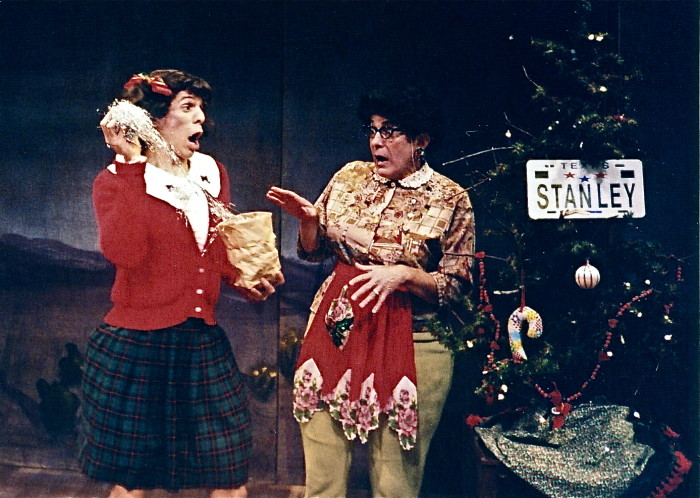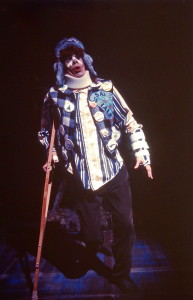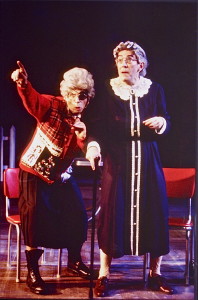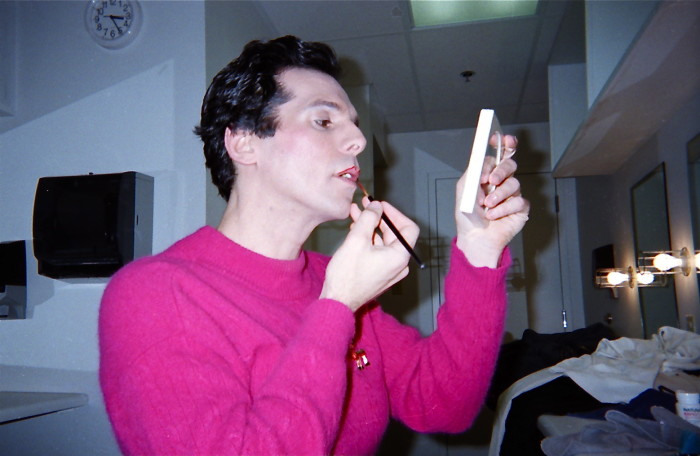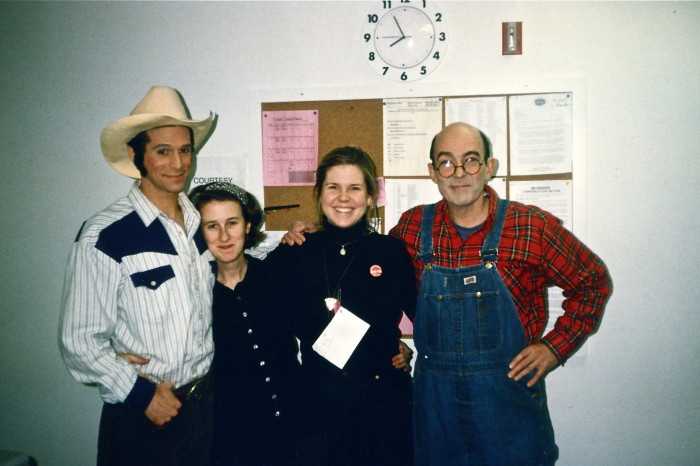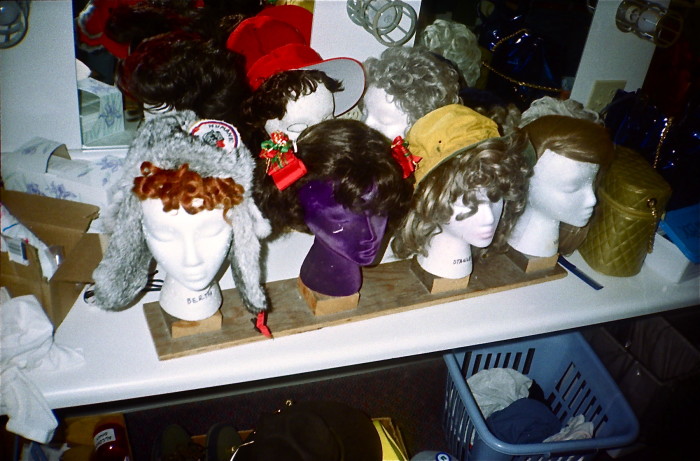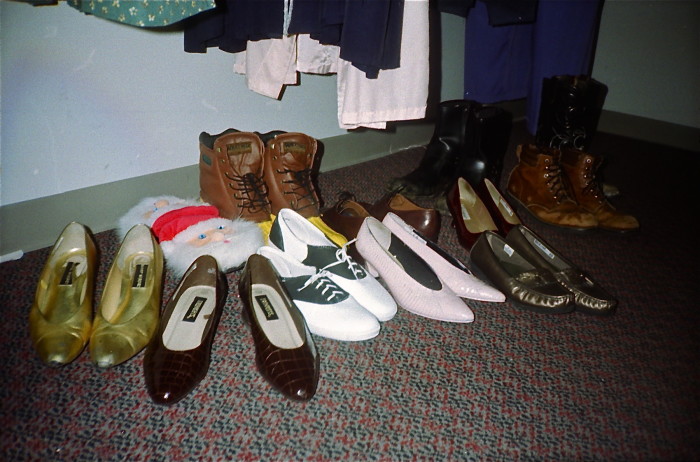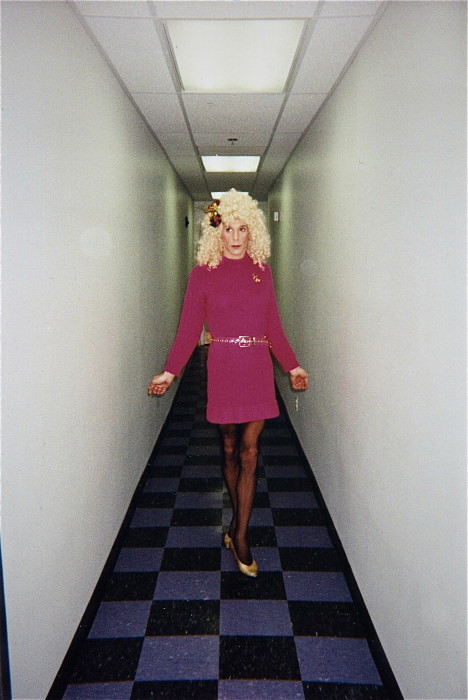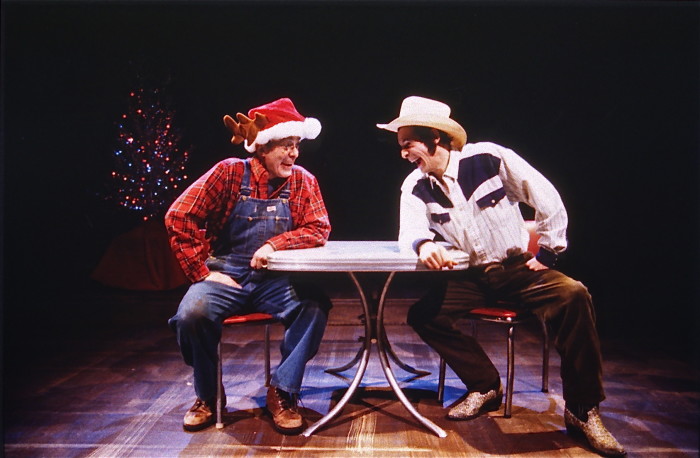
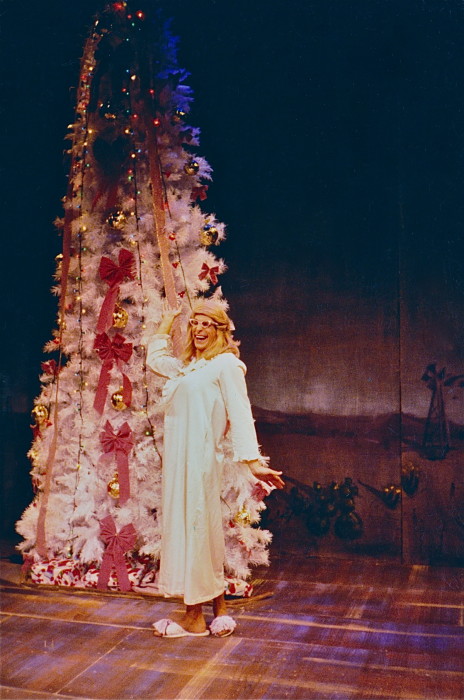
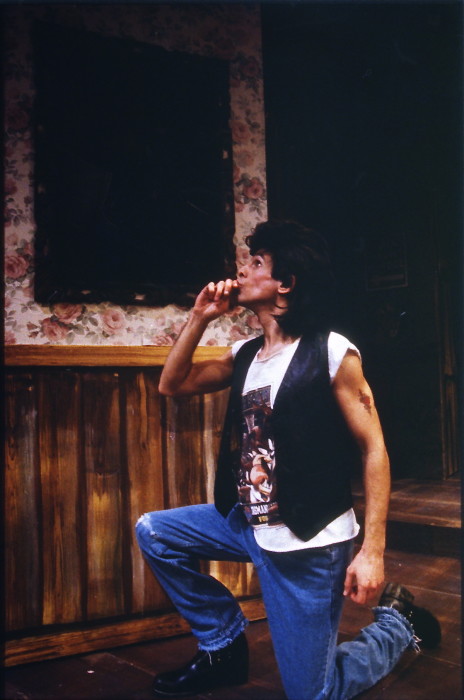
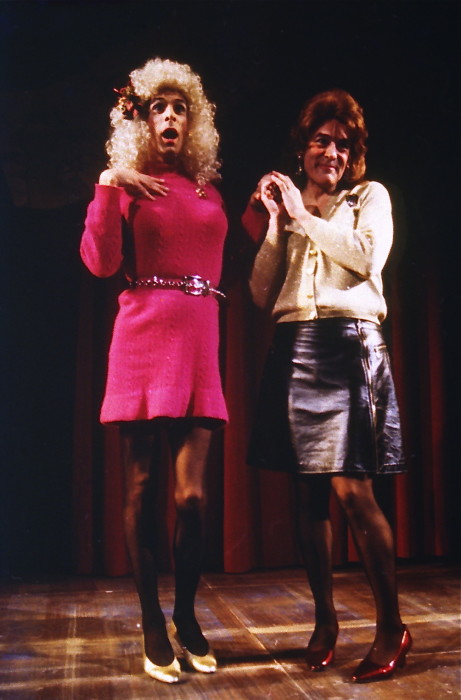
Backstage
Above: getting into makeup; with our fierce and unflappable dressers: T. Ryder, Pat Kealy, Buffy Statchel, Ed Sala; my wigs; my shoes; practicing walking in heels.
Full reviews
The Abingdon Virginian, Robert Wiesfeld – With it’s sly gay sensibility and rueful humor, audiences might (but probably don’t want to) question their own laughter at ‘A Tuna Christmas’ . . . Rocks are lifted within a rural, predominantly Baptist, hypocritically conservative setting, and out slither characters one senses are based on life, heightened and trimmed up to greater comic effect with camp elements, smutty jokes, bitchy one-liners and more than a little cross-dressing. ‘Tuna’ has a lot of laughs at the expense of small-town Americana’s pitfalls – it’s resolute, smug ignorance, seething illy-concealed sex drives, dead-end employment/relationships, and shattered, feeble dreams. But it also celebrates individual eccentricity as part of the life-force anywhere, and, if viewers are willing to look deeper, sends a sage message: it is second human nature to feel one is an outsider no matter how much one attempts to conform; and that our individual weirdness defines us, makes us interesting and colorful, and should be lauded instead of concealed. In this way ‘Tuna’ balances it’s underlying bitter anger with genuine affection for humanity, and this yuletide sequel allows us to escape our own driven holiday desperation (the short-circuiting of human resources attempting to celebrate the Divine), as we watch hilariously pitiful hayseeds scramble to embrace the American Christmas ideal. The laughter audience members experience is really quite healthy, especially during a season when human dysfunction reaches it’s zenith. Here, ‘Tuna’s message seems to urge us to try and reach some kind of acceptance resolution in regard to our own and each other’s holiday and family insanity – and lighten up. To faithful readers with a sense of recall, I must say I wish it had been playing last year . . . Despite more than a few solid laughs, ‘Tuna’s’ script needed judicious pruning. It’s first act, establishing or re-establishing the characters, runs an interminable 90 minutes – too long for what ‘Tuna’ is. And throughout the play, ‘Tuna’ uses set-piece sketches, each of which is made lengthy by repetition. The authors, who just might have been inspired by John Waters’s camp films examinations of Baltimore, would have done better to integrate these sketches into more of a quickly-moving fluid whole. Instead it appears they got frightened and fell back on their original cabaret-theatre format. It’s too bad, because the bones of legit comedic playwriting are all here, and it wouldn’t take too much tinkering to make ‘Tuna’ sleek as a rainbow trout. Barter has given ‘Tuna’ loving production values, expanding it’s basic smallness into Main Stage largesse. Crystal Tiala’s set is serviceable, and she gets visual mileage out of presenting several rampant Tannebaums, and an audience-pleasing UFO. This latter ruse gives David G. Silver-Friedl’s lighting skills some playful exercise, as do malfunctioning tree lights, which this critic has already experienced this season: Art does imitate life. Just when the evening begins to look too lightweight, Scott Koenig’s effective sound choices add a few strokes of needed sentiment. Amanda Aldridge has [accepted] the comic gauntlet and cut loose on costumes which are a parade of invitations to guffaw, especially in the stretch-pants department. And director David Mckenna appears to have second-guessed the script’s every comic possibility. Of the two actors, each enacting 11 roles, T. Ryder Smith fares best by embracing more entertainer than actor sensibility, allowing him a hefty foot up in going over the top, a requirement for these types of knockabout farce. Smith isn’t afraid to resort to time-honored comedy burlesque traditions (e.g. ‘takes’) which punctuate his characters like polaroids. This isn’t to say he’s an actor going for cheap laughs, but one who mines comedy material fully. It’s an instinct which separates the true comic from the merely talented comic actor. Ed Sala has more an actor’s actor touch: but needs directorial encouragement to broaden an already well-established comic sense,especially when cross-dressed, which requires a great deal of letting go. It doesn’t help Sala that he’s saddled with Aunt Pearl Burras, the evening’s tamest character, who needs a screwy comic touch (e.g., Jonathan Winters or Charlie Weaver – – maybe a big tummy would have helped). But the performance this critic viewed saw Sala ease considerably after intermission, when both actors hit a mutual high-point playing ‘Tuna’s very funny floozies. I have to admit I attended ‘A Tuna Christmas’ prepared to despise it. Sometimes in hearty laughter over the likes of ‘Hee-Haw’, I fear we Appalachians will be encouraged to go backwards, thinking we’ve been given permission to enact redneck consciousness with regressive atrocity. But ‘A Tuna Christmas’, with it’s flamboyant sexuality, flaunting of convention and to some, momentary gender discomfort over what they’re laughing with and at when they wouldn’t accept it in real life, attempts in it’s own gallows-humored way to enlighten as well as amuse. I’m reminded of an observation once made by George Bernard Shaw: ‘If you tell people the truth, make them laugh or they’ll kill you’. ‘Tuna’ informs us that the inside is only the collective outside bound by fear, ignorance and crumbling Puritan ethic. Each of us might as well come in from the storm of moral judgment and learn to laugh at ourselves, which could possibly take up enough time to keep our attention focused on our OWN business. But – outside the confines of theatrical safety – can we do it?
[previous] [next]
